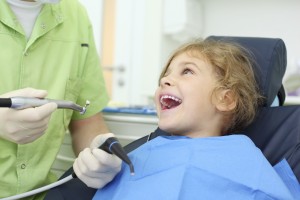
Your child’s first dental appointment sets the tone for how they feel about the dentist for the rest of their lives.
The average child develops teeth between three and 12 months of age. By the time your child is three years old, they will have 20 teeth inside their mouth. Some parents question proper dental care for these baby teeth and also wonder how to teach their kids to properly clean their mouths. So, how do you teach kids not to be scared of a foreign object being pushed into their mouths or of the dentist who is going to gently stick their fingers in their mouth? Here are some tips and tricks about caring for your little one’s teeth.
What You Should Know
Baby teeth serve many different functions aside from chewing up food. The little teeth are actually placeholders for big teeth, which will come in by age 12 or 13. Although there are 20 baby teeth, adults actually have 28 teeth including the wisdom teeth. Another function of baby teeth includes speech. Think of how many words use the “TH” sound or the “CH”, these sounds are made by using the teeth. Also think about how many times a child smiles per day. This smile is part of a child’s social skills and will be important for the rest of their lives. To help take care of your baby’s teeth early, never let your child fall asleep with a bottle or sip cup in their mouths. Milk, juice, formula, and other drinks contain sugars that can rot your child’s teeth before they are even finished growing.
Tips and Tricks for Success
Gum health is just am important to a baby as tooth health is important later in life. Wash your child’s gums with a wet cloth or specialty wipes after each feeding to ensure healthy gums. As soon as the first tooth is visible in your child’s mouth, start brushing with a soft-bristled toothbrush. Shortly after seeing a first tooth, make sure to visit the dentist for their first checkup. While going to a dentist can be a bit scary for the first time, don’t let your child sense your fear. Play dress up at home to ease their fear of going to the dentist for the first time.
Most children learn by observing and by doing tasks. Show your child how to brush their own teeth and let them take over from there. Most dentists expect children of three years old to be able to brush their own teeth. Try using special mouthwash like LISTERINE® SMART RINSE® which will show children where they missed brushing. This independence will teach your child the value of a clean and healthy mouth.
Leikin & Baylin Dental Care of Catonsville
If you have questions about the health of your child’s teeth, or your little one is experiencing one of these childhood dental problems, let our friendly and professional staff help restore your dental health. Call today at 410-747-1115, or submit any questions by visiting CatonsvilleDentalCare.com.
Disclaimer: The writer of this article is not a medical professional. Information contained herein has been collected from sources believed to be reliable, and every precaution has been taken to ensure its accuracy. The information provided here is for general informational purposes only, and should not be used as a substitute for professional medical care.
